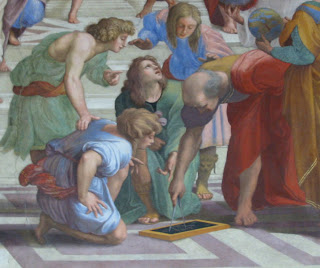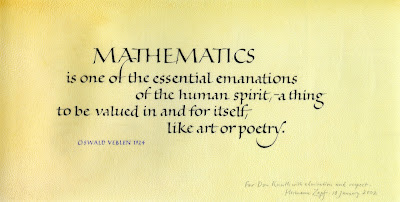Mathematics
From Wikipedia, the free encyclopediaMathematics (from Greek μάθημα máthēma, "knowledge, study, learning") is the abstract study of topics encompassing quantity, structure, space, change, and other properties; it has no generally accepted definition.
Mathematicians seek out patterns and formulate new conjectures. Mathematicians resolve the truth or falsity of conjectures by mathematical proof. The research required to solve mathematical problems can take years or even centuries of sustained inquiry. Since the pioneering work of Giuseppe Peano (1858–1932), David Hilbert (1862–1943), and others on axiomatic systems in the late 19th century, it has become customary to view mathematical research as establishing truth by rigorous deduction from appropriately chosen axioms and definitions. When those mathematical structures are good models of real phenomena, then mathematical reasoning can provide insight or predictions about nature.
 |
| Euclid, Greek mathematician, 3rd century BC,as imagined by Raphael in this detail from The School of Athens. |
Through the use of abstraction and logical reasoning, mathematics developed from counting, calculation, measurement, and the systematic study of the shapes and motions of physical objects. Practical mathematics has been a human activity for as far back as written records exist. Rigorous arguments first appeared in Greek mathematics, most notably in Euclid's Elements. Mathematics developed at a relatively slow pace until the Renaissance, when mathematical innovations interacting with new scientific discoveries led to a rapid increase in the rate of mathematical discovery that has continued to the present day.
Galileo Galilei (1564–1642) said, "The universe cannot be read until we have learned the language and become familiar with the characters in which it is written. It is written in mathematical language, and the letters are triangles, circles and other geometrical figures, without which means it is humanly impossible to comprehend a single word. Without these, one is wandering about in a dark labyrinth." Carl Friedrich Gauss (1777–1855) referred to mathematics as "the Queen of the Sciences." Benjamin Peirce (1809–1880) called mathematics "the science that draws necessary conclusions." David Hilbert said of mathematics: "We are not speaking here of arbitrariness in any sense. Mathematics is not like a game whose tasks are determined by arbitrarily stipulated rules. Rather, it is a conceptual system possessing internal necessity that can only be so and by no means otherwise." Albert Einstein (1879–1955) stated that "as far as the laws of mathematics refer to reality, they are not certain; and as far as they are certain, they do not refer to reality."
Mathematics is used throughout the world as an essential tool in many fields, including natural science, engineering, medicine, and the social sciences. Applied mathematics, the branch of mathematics concerned with application of mathematical knowledge to other fields, inspires and makes use of new mathematical discoveries, which has led to the development of entirely new mathematical disciplines, such as statistics and game theory. Mathematicians also engage in pure mathematics, or mathematics for its own sake, without having any application in mind. There is no clear line separating pure and applied mathematics, and practical applications for what began as pure mathematics are often discovered.
Definitions of Mathematics
Mathematics has no generally accepted definition. Different schools of thought, particularly in philosophy, have put forth radically different definitions. All are controversial.
Aristotle defined mathematics as "the science of quantity", and this definition prevailed until the 18th century. Starting in the 19th century, when the study of mathematics increased in rigor and began to address abstract topics such as group theory and projective geometry,
which have no clear-cut relation to quantity and measurement,
mathematicians and philosophers began to propose a variety of new
definitions.
Some of these definitions emphasize the deductive character of much of
mathematics, some emphasize its abstractness, some emphasize certain
topics within mathematics. Today, no consensus on the definition of
mathematics prevails, even among professionals. There is not even consensus on whether mathematics is an art or a science. A great many professional mathematicians take no interest in a definition of mathematics, or consider it undefinable. Some just say, "Mathematics is what mathematicians do."
Three leading types of definition of mathematics are called logicist, intuitionist, and formalist, each reflecting a different philosophical school of thought. All have severe problems, none has widespread acceptance, and no reconciliation seems possible.
An early definition of mathematics in terms of logic was Benjamin Peirce's "the science that draws necessary conclusions" (1870). In the Principia Mathematica, Bertrand Russell and Alfred North Whitehead advanced the philosophical program known as logicism,
and attempted to prove that all mathematical concepts, statements, and
principles can be defined and proven entirely in terms of symbolic logic. A logicist definition of mathematics is Russell's "All Mathematics is Symbolic Logic" (1903).
Intuitionist definitions, developing from the philosophy of mathematician L.E.J. Brouwer,
identify mathematics with certain mental phenomena. An example of an
intuitionist definition is "Mathematics is the mental activity which
consists in carrying out constructs one after the other."
A peculiarity of intuitionism is that it rejects some mathematical
ideas considered valid according to other definitions. In particular,
while other philosophies of mathematics allow objects that can be proven
to exist even though they cannot be constructed, intuitionism allows
only mathematical objects that one can actually construct.
Formalist definitions identify mathematics with its symbols and the rules for operating on them. Haskell Curry defined mathematics simply as "the science of formal systems". A formal system is a set of symbols, or tokens, and some rules telling how the tokens may be combined into formulas. In formal systems, the word axiom
has a special meaning, different from the ordinary meaning of "a
self-evident truth". In formal systems, an axiom is a combination of
tokens that is included in a given formal system without needing to be
derived using the rules of the system.
To learn more on the different definitions of Mathematics, click Definitions of Mathematics



0 comments:
Post a Comment